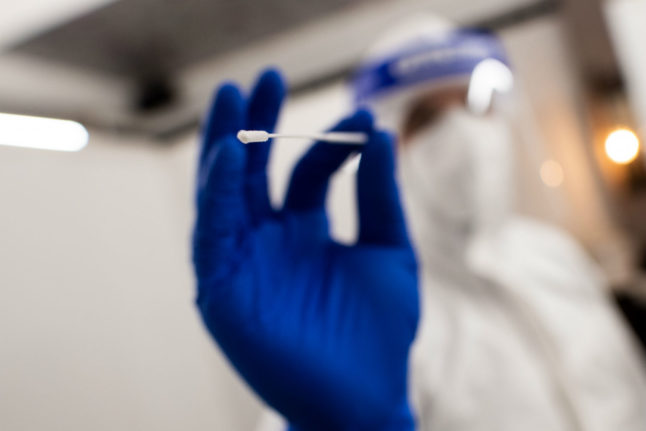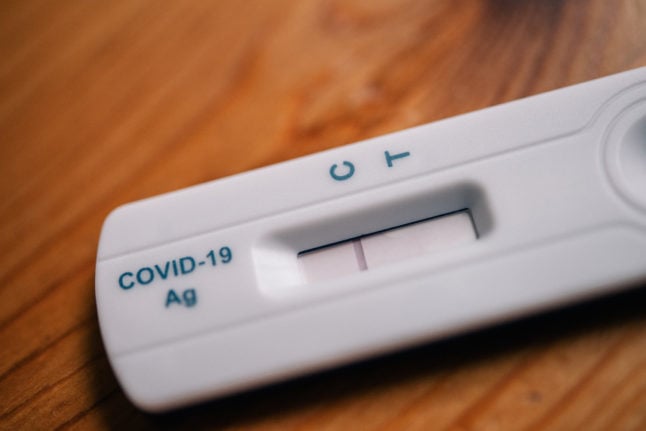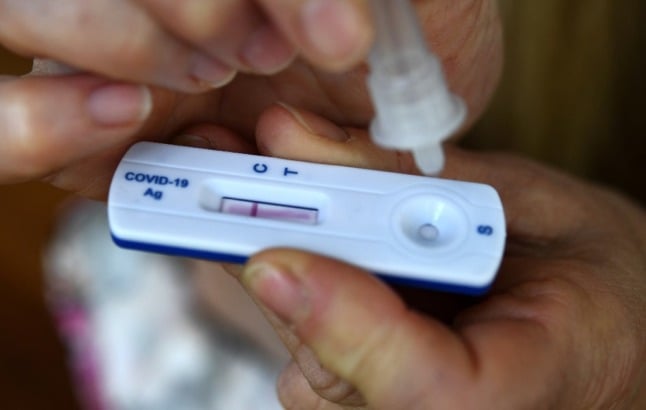Aldi Nord and Aldi Süd announced Wednesday that customers will only be allowed to buy one pack at a time to avoid hoarding, and so that as many people as possible can benefit.
A package includes five tests for a nasal swab, with a price of about €25 per package.
Sales also in drugstores and supermarkets
Drugstore chains Rossmann and DM plan to start selling the products next Tuesday March 9th. Pharmacies around Germany have said that they also want to begin offering the products soon. Discounter competitor Lidl and the supermarket Rewe and Edeka also have the issue on their radar.
In late February the Federal Institute for Drugs and Medical Devices had granted special approvals for coronavirus self-tests for the first time. For all three products, samples are taken by swabbing the front of the nose.
Free rapid tests from next week
On Wednesday a coronavirus summit between Chancellor Angela Merkel and Germany’s 16 federal and state governments decided that every German resident would be able to receive a free “conventional” rapid test completed by a medical professional starting next week. Drugstore chain DM has already been accepting sign-ups for in-store testing sites.
READ ALSO: EXPLAINED: This is Germany’s five-step plan to head out of shutdown
Health Minister Jens Spahn had originally announced that free rapid tests would be available to all from March 1st – but this plan has been changed slightly.
In concrete terms, it means at least one rapid test per week will now be offered to people in Germany. It will be carried out by a trained member of staff in test centres or surgeries, for example.
In addition, according to the plans of the federal and state governments, a joint task force is to be set up to procure tests quickly and cheaply.
How easy is it to test yourself at home?
There’s a big plus for the new rapid DIY tests: the sample with the cotton swab can be taken in the anterior nasal region, and so it’s fairly easy to do at home.
The professional rapid tests, on the other hand, collect the sample material far back in the nose or deep in the throat – meaning that a specialist is needed to assist.

A professional rapid test. Photo: DPA
No additional laboratory equipment is needed for the rapid tests. The principle is similar to a pregnancy test: after 15 to 20 minutes, test strips indicate whether the patient is coronavirus positive or negative.
The Frankfurt virologist Sandra Ciesek sees few problems with the at-home tests: “I think everyone gets how to do a nasal smear, and if not, there are enough videos to show them how,” she said in the NDR podcast Coronavirus Update.
READ ALSO: What you need to know about Germany’s new at-home coronavirus tests
However, rapid tests are not as reliable as PCR tests which are analysed in a lab. According to the Robert Koch Institute (RKI), if the result of an antigen test is positive, the person should isolate and contact their doctor or local health department to arrange for a PCR test.
People are also reminded to continue to stick to distance and hygiene rules even if they have a negative rapid test result.
What are German politicians saying?
Free Democratic (FDP) leader Christian Lindner already emphasised in mid-February that coronavirus rapid tests could be a chance for more freedom in the midst of the ongoing and drastic pandemic.
As a so-called “vaccination card for a day,” the rapid tests could offer temporary normality and allow more freedoms in the short term, such as visits to restaurants or concerts.
Social Democratic (SPD) health expert Karl Lauterbach even went one step further and told broadcaster WDR that the pandemic could be massively eased with the help of rapid tests. Corresponding studies prove this, he said.
But as with vaccinations, there is a problem with rapid tests: availability. To stop the pandemic, all Germans would have to test themselves twice a week.
That corresponds to 160 million rapid tests per week. Some see this as an utopian goal since the current quota is just 45 million rapid tests per month.



 Please whitelist us to continue reading.
Please whitelist us to continue reading.
Right, this wont end well